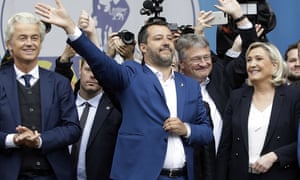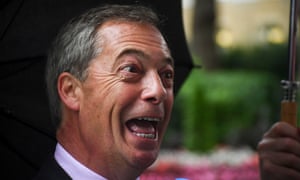Marine Le Pen and Matteo Salvini’s MEPs have joined forces with anti-immigration parties across Europe to create the biggest far-right group in the European parliament.
Despite promises to become “a thorn in the flesh of the establishment”, the group of 73 MEPs falls short of Salvini’s ambition of upending the system of EU lawmaking by becoming the third-largest group in the parliament.
Known as Identity and Democracy (ID), the group will instead be the fifth largest, and its influence over EU lawmaking looks doubtful. While the far right now has 10% of MEPs in the new European parliament, compared with 5% in the 2014-19 session, other parties are not expected to vote far-right MEPs into influential positions.
Identity and Democracy will be led by Marco Zanni, an MEP from Italy’s League party, which enjoyed stunning success in the European elections in Italy. The League is led by Salvini, who is also Italy’s deputy prime minister and the interior minister.
The ID group failed to convince Nigel Farage and his Brexit party to join.
Zanni, who met Farage earlier this month, said the door remained open to the Brexit party and others, such as Spain’s Vox. “We were unable to create a united group for a number of reasons with the Brexit party,” he told journalists at a launch press conference. “It’s not a defeat, it’s a very open relationship, we are open to them if they want to cooperate.” He said it was important for all parties with a “radically different view of Europe” to join forces.
However, the ID group appears to strike a different tone to the Brexit party. The UK’s chaotic attempt to leave the EU has led Eurosceptic parties to drop or drastically tone down their demands to quit the bloc. “Some people say that we want to destroy the EU, I want to contradict that,” Jörg Meuthen, of the Alternative for Germany group, another ID member, told journalists.
He said the new group wanted to work collaboratively, but sometimes that meant saying no. “The EU needs to be limited and reformed,” he said, adding: “We are here to be a thorn in the flesh of the establishment.”
Eurosceptic parties have long been split on big issues, such as relations with Russia. While the League and Le Pen’s National Rally have warm ties with the Kremlin, Scandinavian and Baltic far-right parties see Russia as a threat to be contained.
Le Pen, who leads France’s National Rally part, formerly the National Front, said different opinions on issues such as Russian sanctions were not surprising, given different cultures and traditions. “On the big issues we have a common vision and we are here to show you that,” she said.
In the European parliament, Eurosceptic rightwing populists have been scattered across four groups, limiting their influence.
Jussi Halla-aho, of the Finns, a Finnish party allied with British Conservatives in the last parliament, said the Eurosceptic right had long been weakened by their failure to unite.
Divisions remain present. Despite a threat of expulsion from the European People’s party, the Hungarian prime minister, Viktor Orbán, shows no sign of seeking to remove his Fidesz MEPs from that traditional centre-right bloc.
Poland’s ruling Law and Justice party is expected to remain in the Eurosceptic European Conservatives and Reformists group.
Farage is hoping to resurrect a separate Eurosceptic group, the Europe of Freedom and Direct Democracy, which would allow him to retain his primetime speaking slot in European parliament debates.
But he is having trouble finding allies. Under European parliament rules, a group must consist of MEPs from at least seven countries. Being in a group allows MEPs to benefit from more EU funds and the chance to get senior jobs in drafting EU legislation.
The EFDD has been a marriage of convenience with Italy’s Five Star Movement, but the Italians have yet to commit to joining Farage again. An M5S source said an alliance with the Brexit party was neither agreed nor ruled out.
Le Pen said her group was “more mature” than its predecessor, because some of the parties had served in government.
She was speaking shortly after it emerged she would face trial in France over publishing images of Islamic State atrocities on Twitter in December 2015, confirmed by French judicial sources. She had tweeted the images after some French media carried comments comparing her party to Islamic State.
Le Pen has called the legal proceedings “shameful”, saying she was wrongly being singled out by morally questionable ruling “elites”. Le Pen’s immunity to prosecution as a member of parliament was lifted in 2017 so she could be investigated over the Twitter images. A date has not yet been set for the trial.


